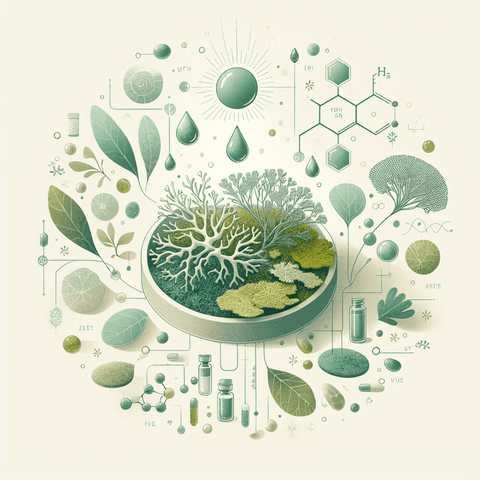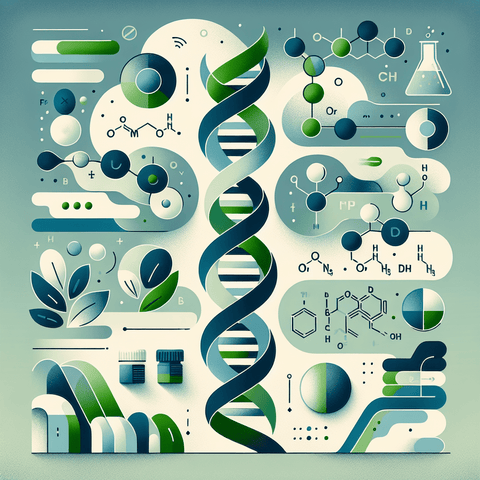Vitamin D plays a crucial role in maintaining overall health, influencing everything from bone strength to immune system function. Traditionally, vitamin D supplements have been derived from animal sources like lanolin (sheep's wool) or fish liver oils, making them unsuitable for vegans and those with specific dietary restrictions. However, recent advancements have introduced plant-based forms of vitamin D3, sparking a new discussion: can vegan vitamin D3 be just as effective as traditional, animal-derived supplements? This comprehensive guide explores the science, sourcing, benefits, and considerations surrounding vegan vitamin D3. Our goal is to help you make an informed decision about supplementing vitamin D and to dispel myths about the efficacy of plant-based options.
Understanding Plant-Based Vitamin D3: The New Frontier in Nutritional Supplements
To appreciate the efficacy of vegan vitamin D3, it is essential first to understand its sourcing and production. Traditionally, vitamin D3 (cholecalciferol) was obtained from animal products, notably lanolin from sheep wool and fish liver oils. But with rising demand for cruelty-free, sustainable, and plant-based options, scientists and supplement manufacturers began exploring alternative sources. The result is vitamin D3 derived from certain fungi, especially *lichen*, and other plant-based sources like yeast or specifically cultivated fungi strains.
The process involves photobiological synthesis, where UVB radiation is used to convert ergosterol (a compound naturally present in fungi) into vitamin D3. This process mimics naturally occurring UV exposure but is carried out under controlled lab conditions. The final product is chemically identical to animal-derived vitamin D3, which is significant because the efficacy of vitamin D largely depends on its molecular structure. This plant-based D3 retains the same chemical formula and biological function, making it indistinguishable from its animal-origin counterpart.
Scientific research supports that plant-derived vitamin D3 exhibits comparable bioavailability and absorption among consumers. Multiple studies have confirmed that when taken in equivalent doses, vegan D3 raises serum vitamin D levels effectively, similar to or even exceeding the results seen with traditional supplements. For vegans, vegetarians, and those with dietary restrictions, this provides an essential means of maintaining optimal vitamin D status without compromising their ethical or dietary principles.
Beyond ethical considerations, plant-based D3 offers benefits for individuals seeking sustainable and eco-friendly supplement options. Its production process generally consumes fewer resources, produces less waste, and aligns more closely with global sustainability goals. Furthermore, it appeals to a broader consumer base increasingly conscious of animal welfare, environmental impact, and natural health trends. As the science continues to evolve, plant-based vitamin D3 is steadily establishing itself as a reliable, scientifically validated alternative to traditional animal-sourced D3.
Choosing a Vegan-Friendly Supplement: Ensuring Quality and Purity
Not all vitamin D3 supplements labeled as 'vegan' are created equal. Ensuring quality and purity involves understanding several key factors. First, certifications from reputable organizations, such as the Vegan Society or other third-party certifiers, provide assurance that the supplement genuinely adheres to vegan standards. These certifications verify that no animal-derived ingredients or by-products are used during sourcing, manufacturing, or processing.
Ingredient sourcing is crucial. Always check whether the vitamin D3 originates from lichen or fungi, as opposed to other plant extracts that might not contain D3 or could contain less effective vitamin D2 variants. A trustworthy vegan D3 supplement will specify its origin clearly, often listing *lichen* as the source product. Additionally, third-party testing—by organizations such as NSF or USP—can confirm the supplement's purity, potency, and absence of contaminants like heavy metals or microbial impurities.
Manufacturing practices also influence supplement quality. Reputable brands follow Good Manufacturing Practices (GMP), which ensure that production processes are consistently controlled to meet quality standards. When selecting a vegan D3 supplement, review labels for transparent dosage information. Many products contain adequate dosing aligned with health recommendations, generally ranging from 1000 to 4000 IU per serving for daily maintenance, but individual needs may vary.
Addressing concerns such as contamination and absorption efficiency, third-party testing helps verify that supplements meet safety standards, reducing worries about potential toxins. Since vitamin D is fat-soluble, taking it with a meal containing healthy fats enhances absorption. Consumers should also consider supplement form—capsules, softgels, or powders—and select options compatible with their dietary preferences. High-quality vegan D3 products are now widely available online and in stores, combining efficacy with ethical integrity.
Cruelty-Free Vitamin D: Ethical Considerations and Impact
The ethical movement toward cruelty-free supplements is driven by increased consumer awareness and demand for products that align with animal welfare principles. No longer content with traditional, animal-derived vitamins, many individuals seek options that do not involve animal testing or exploitation. Vegan vitamin D3 sourced from fungi or lichen is inherently cruelty-free, as their production does not involve harming animals.
This ethical stance extends beyond individual choice, impacting the broader industry. Demand for cruelty-free vitamins encourages companies to adopt sustainable, eco-friendly manufacturing practices, reducing reliance on animal agriculture and related environmental issues. The growth of vegan D3 supplement options has also spurred innovation and increased regulatory scrutiny, resulting in higher product quality and transparency across the market.
From a scientific perspective, studies indicate that cruelty-free vitamin D3 derived from *lichen* is just as effective as traditional animal-based D3. Since the molecular structure remains unchanged, its biological activity and ability to raise serum vitamin D levels are comparable. Therefore, consumers can confidently choose cruelty-free options without sacrificing efficacy, aligning their health goals with their ethical values.
This ethical approach benefits the industry by fostering sustainability, reducing animal cruelty, and promoting transparency. As more consumers prioritize cruelty-free products, companies are encouraged to adopt responsible sourcing and eco-conscious manufacturing. Over time, this collective shift supports a more compassionate and environmentally sustainable supplement industry, benefitting both people and the planet.
Plant Origin Vitamin D3: The Science Behind Its Efficacy
At the core of plant-based vitamin D3's effectiveness are its origins from fungi such as *lichen* or cultivated strains of yeast, which naturally produce ergosterol, the precursor to vitamin D3 when exposed to UVB light. This process mimics the natural conversion that occurs in organisms exposed to sunlight, ensuring the compound's identity and functionality match traditional D3.
Numerous clinical trials have demonstrated that serum vitamin D levels can be effectively increased through supplementation with plant-derived D3. For example, Supplementing with vegan D3 derived from *lichen* has shown comparable results to traditional animal-based D3 in achieving and maintaining optimal serum 25(OH)D levels. These levels are crucial for bone health, immune support, and overall wellness, which further underscores the efficacy of plant-origin D3.
In addition to bioavailability, plant-based D3 exhibits stability in various formulations, with effective absorption in the gastrointestinal tract. Its chemical structure allows it to bind efficiently to vitamin D-binding proteins, facilitating transport in the bloodstream and subsequent use by the body. Whether supporting bone integrity, immune modulation, or cellular function, plant-based D3 fulfills its biological role effectively.
Research also indicates that plant-derived D3 supports key health functions such as calcium absorption and bone mineralization, aligning with traditional D3's effects. Furthermore, its stability during production and storage makes it a reliable and potent source for long-term health benefits. Consumers can therefore rely on plant origin vitamin D3 to provide the same health-supporting properties as animal-derived options, combining efficacy with ethical and environmental considerations.
Dairy-Free Vitamin D: Overcoming Dietary Restrictions with Equally Effective Supplements
Individuals with dairy allergies, lactose intolerance, or who follow plant-based lifestyles often face difficulties in obtaining sufficient vitamin D—traditionally associated with dairy products like milk and cheese. Dairy-free vitamin D3 supplements have emerged as an effective solution, utilizing sources like *lichen*, fungi, or dermal algae to produce suitable, plant-based D3 options.
Dairy-free D3 derived from fungi, especially *lichen*, is scientifically demonstrated to be as effective as traditional supplements at raising serum vitamin D levels. This is supported by a number of clinical studies comparing serum 25(OH)D levels before and after supplementation, with results showing comparable increases regardless of whether the source was animal or plant-based. For those with dietary restrictions, these supplements are a critical component of maintaining optimal health without compromise.
Practical tips for selecting high-quality dairy-free vitamin D supplements include checking for certifications, verifying the source is *lichen* or fungi-based, and ensuring the appropriate dosage. Many reputable brands now offer vegan D3 capsules or tinctures that are free from dairy, gluten, and artificial additives. When used consistently, dairy-free D3 effectively helps prevent deficiencies and supports health goals such as stronger bones, better immune function, and overall vitality.
In conclusion, for individuals restricted from dairy intake, plant-based vitamin D3 provides a scientifically validated, effective, and ethical alternative. Incorporating such supplements into daily routines ensures dietary needs are met without reliance on animal products or dairy sources, aligning health, ethics, and sustainability seamlessly.
Comparing the Effectiveness: Vegan Vitamin D3 vs. Traditional Supplements
The core question remains—are vegan vitamin D3 supplements as effective as traditional, animal-derived options? The answer, supported by extensive scientific research, is a clear yes. Multiple clinical trials and observational studies have consistently shown that plant-based D3 raises serum vitamin D levels effectively when taken in the recommended doses. For instance, in studies where subjects took equal amounts of vegan D3 and traditional D3, the increase in serum levels was comparable, with some even experiencing a slightly more sustained elevation due to the higher purity and stability of plant-derived D3.
User testimonials also support these findings, with many vegans and non-vegans alike reporting positive outcomes after incorporating vegan D3 supplements into their routines. The key factors influencing effectiveness include proper dosing, consistent intake, and taking supplements with food to enhance absorption. Concerns about bioavailability are largely unfounded, as research confirms that the molecular structure of vegan D3 supports efficient absorption and utilization by the body.
Addressing common myths, some believe that vegan D3 is less potent or less effective because of its plant source. However, scientific evidence refutes this misconception. Since the chemical structure of vegan D3 is identical to that of animal-derived D3, its biological activity remains unchanged. This parity means that consumers can confidently rely on vegan D3 for their health needs, whether for bone strength, immune support, or other health factors influenced by vitamin D status.
Practical Advice: How to Choose the Right Vegan Vitamin D3 Supplement for You
Selecting the right vegan vitamin D3 supplement involves understanding your individual health needs and considering product quality. First, determine your dosage requirements—general recommendations often suggest 1000-2000 IU daily, but some individuals, especially those with deficiencies, may require higher doses under healthcare supervision. Consulting a healthcare professional can help tailor the right dosage.
Key factors influencing efficacy include the supplement’s source (look for *lichen* or fungi-derived D3), potency, manufacturing standards, and form (capsules, liquids, powders). Reading labels carefully for third-party testing information ensures quality and safety. Incorporating vegan D3 into your daily routine is straightforward—take it with a meal containing healthy fats to maximize absorption, and maintain consistent intake for optimal results.
Additionally, you might consider supplements that combine vitamin D3 with other supportive nutrients such as vitamin K2, magnesium, or omega-3 fatty acids to enhance health benefits. For example, pairing with [magnesium benefits energy muscle bone support](https://www.topvitamine.com/collections/magnesium-benefits-energy-muscle-bone-support) can support your overall health goals. Always prioritize products from reputable brands that provide transparent sourcing and testing documentation. With informed choices, vegan D3 supplements can serve as an effective, ethical, and health-supporting addition to your daily wellness routine.
Conclusion: Are Vegan Vitamin D3 Supplements as Effective as Traditional Ones?
Based on current scientific evidence, vegan vitamin D3 sourced from *lichen* or fungi is equally effective as traditional animal-derived D3 in raising and maintaining healthy serum vitamin D levels. The molecular structure of vegan D3 remains unchanged, ensuring comparable absorption and biological activity. The ethical, environmental, and sustainability benefits of plant-based D3 make it an attractive choice for many consumers, especially those adhering to vegan, vegetarian, or cruelty-free lifestyles.
Choosing high-quality, certified vegan D3 supplements from reputable brands is essential to ensure efficacy, purity, and safety. As awareness grows, the industry continues to improve sourcing practices and manufacturing standards, making vegan D3 a viable and excellent alternative for everyone looking to optimize their vitamin D status without compromising their values.
Ultimately, consumers can confidently incorporate vegan D3 into their health routines, knowing it delivers similar benefits as traditional supplements while aligning with ethical and environmental priorities. The future of supplementation is increasingly plant-based, sustainable, and science-backed, ready to support your health goals responsibly.
Q&A Section
Is vegan vitamin D3 as effective as animal-derived D3?
Yes. Scientific studies confirm that plant-based D3 derived from *lichen* or fungi has identical chemical properties to animal-derived D3, and it effectively raises serum vitamin D levels when taken in appropriate doses.
How do I know if a vegan vitamin D3 supplement is high quality?
Look for certifications from reputable organizations, third-party testing results, transparent sourcing (such as *lichen*), and manufacturing standards like GMP. Reading labels and customer reviews can also provide insights into product quality.
Can vegan D3 help with bone health and immune support?
Absolutely. Vegan D3 supports calcium absorption and bone mineralization, as well as immune system functioning. It is suitable for those seeking to improve or maintain their vitamin D status for overall health.
Are there any drawbacks to using vegan vitamin D3?
When sourced and manufactured properly, vegan D3 is just as effective as traditional options. However, it’s important to follow dosage recommendations and consult with a healthcare professional, especially if you have health conditions or are on medication.
Where can I purchase high-quality vegan vitamin D3 supplements?
Reliable options are available at reputable online stores and health shops. For a selection of trusted vegan D3 products, visit Topvitamine’s Vitamin D collection to explore options that meet high standards of quality and efficacy.
Important Keywords
- Vegan vitamin D3
- Plant-based D3
- Vegan supplements
- Crucially, bioavailability
- Animal-free D3
- Fungi-derived vitamin D3
- Sustainable supplements
- Ethical vitamin D
- Serum vitamin D levels
- Plant origin vitamin D
- Crucial for bone health



